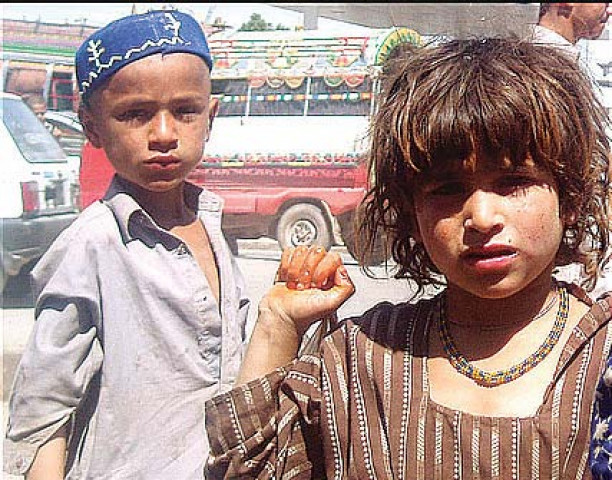Spare change
I have a very clear recollection of the moment I became aware of the ‘wrongness’ of begging.

I have a very clear recollection of the moment I became aware of the ‘wrongness’ of begging. My grandmother and I were in the backseat of our car when we stopped at a traffic light and an old woman tapped at the window, asking for money. In her arms she held a sleeping infant. My grandmother turned sharply towards her: “Why don’t you work for money?” she said. “Come home with me now and I’ll give you a job and a salary.” The woman smiled a helpless, apologetic smile.
The realisation that this woman did not want to work hit me like a thunderbolt. She wanted our money for free, I thought in shock. The idea that my grandmother was bluffing skimmed my mind briefly — after all, she already had servants and even if she didn’t she wouldn’t pick someone up from the streets like this. Still, despite having no knowledge of the beggar woman’s past or her personal situation, I declared her in my mind to be lazy and stupid. Over the years I honed and polished my arguments. Giving to beggars would perpetuate the culture of begging, and encourage those criminals that maimed young children and sent them to the streets. The money would end up being spent on drugs, and would only discourage the beggars further from finding ‘real work’. By withholding my money from them, I was asserting my opinions and helping society. Also, one could not ignore the sheer inconvenience of it. Men and women walking on the streets making nuisances of themselves: entreating and beseeching; displaying festering sores and broken limbs; carrying thirsty and heat-exhausted babies. No, I would have no part in encouraging this.
With ideas like these in mind, we can dismiss the people who come rapping on our car windows, and feel a very definite thrill of morality. If we were to examine our ideas, they would crumble like dust.
The most prevalent of the feel-good myths is the one about making a statement by refusing money to beggars: if nobody gave them money they would be forced to find other means of income. However, it is ludicrous to imagine that money withheld from begging hands is a step towards the fight against homelessness and unemployment. It is the same logic as that of the inverse gesture: feeling a flush of virtue from giving a hungry man a loaf of bread and believing that in so doing you are fighting famine. The truth is that our petty and occasional donations to beggars do not sustain begging culture. It is poverty that sustains begging culture. Until our nation is lifted out of poverty, there will be people who will beg for money. Our actions actually serve to aggravate rather than remedy the situation because, by confusing the symptoms for the disease, we are missing the real aim: to reconstruct society in a way as to eliminate poverty.
It is also said that beggars do not work, but one should think over this a few minutes. Braving the city streets on one’s feet all day in the pursuit of money could be considered harder work than, for example, adding up figures on an Excel spreadsheet in an air-conditioned office cubicle. George Orwell, in his wonderful short essay on this topic, describes begging as, “a trade like any other; quite useless, of course — but then many reputable trades are quite useless.” Orwell believes that the only thing that society respects when it comes to work is profitability and our reason for despising beggars is the fact that they don’t earn sufficient money.
It is certainly true that when one talks of a ‘successful man’, he is usually one who makes a great deal of money. Yet, respectability is associated with profitability only to a certain degree. The starving poet, for example, may be accorded a great deal of respect by society. Also, in the case of our attitudes towards the Pakistani woman, there is a kind of snobbery associated with the unemployed. Many people don’t like the idea of their wives and daughters not working. There must be more to our disgust of the begging profession than what Orwell proposes.
We tell ourselves that beggars are a drain on society. But it is strange really, to imagine their meager earnings ‘draining’ our wealth, especially since a small minority of the population — industrialists, landowners and politicians — are, in reality, benefactors of a large proportion of total money earned in Pakistan. Much of their money is spent abroad or sealed in bank accounts, and could therefore be described more accurately as a drain.
Then there are the ordinary working men and women, upon whom both the exorbitantly wealthy and the street beggars are dependent. Working hard for our daily bread, the idea of a person demanding money from us for no services rendered is offensive to our sense of self. Robert Louis Stevenson in his essay, ‘An Apology for Idlers’ sums it up like this,
“It is a sore thing to have laboured along and scaled the arduous hilltops, and when all is done, find humanity indifferent to your achievement. Hence, physicists condemn the unphysical … literary people despise the unlettered; and people of all pursuits combine to disparage those who have none.”
It is not rare to question our jobs, to wonder whether we really are happy and it becomes necessary to tell ourselves that what we are doing has worth and meaning, that there is an ultimate cause that we are striving towards. It helps to have a society that reinforces and reflects our worth back onto us. So perhaps, as Stevenson hints, those that beg for money are, in their very action, demeaning the employed. By ignoring the tapping on that window, we may be trying to ignore other tappings in deeper and darker places.
It is human instinct to classify things into good and bad, hero and villain. Certain people — prostitutes, thieves, and beggars — are ‘bad’: undeserving of our respect or compassion. We remove ourselves from these people and dehumanise those that we villianise. “When one has consorted with them, and found that they are ordinary human beings,” Orwell says of beggars, “one cannot help being struck by the curious attitude that society takes towards them.”
Before deciding to cast stones, it is imperative to question the distinctions that we make all too readily. In other words, we must look in the mirror. There is an old Buddhist proverb that tells us, “If you throw a stick to a dog he will run after it unthinkingly. If you throw it to a lion, he will turn around to see where it came from.” In the times we live, of intolerance, value judgments and of a pervasive and growing selfishness, it is important to sit still for a moment and stop chasing sticks.
Published in The Express Tribune, Sunday Magazine, March 20th, 2011.



















COMMENTS
Comments are moderated and generally will be posted if they are on-topic and not abusive.
For more information, please see our Comments FAQ